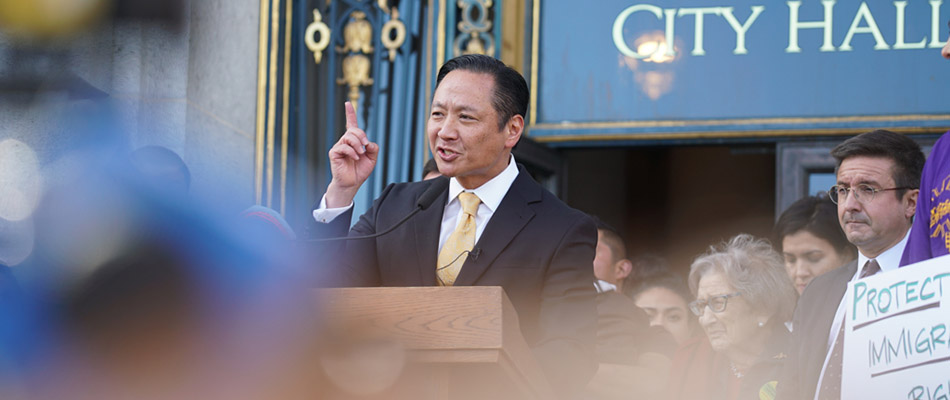
Jeff Adachi
Judge quashes illegal warrant executed against San Francisco journalist, but Bryan Carmody’s fight continues
Police seized 15 computers, tablets and the journalist’s cellphone
By Matthew Keys, July 18, 2019 7:56 pm
A judge in San Francisco tossed a search warrant she issued against a freelance journalist in May, saying police did not disclose to her that the target of the warrant worked in the news media industry.
The ruling, handed down in San Francisco County Superior Court, means materials gathered from the home and office of journalist Bryan C. Carmody cannot be used as evidence against him or anyone else as police continue their investigation into the leak of documents and photographs related to the death of former San Francisco Public Defender Jeff Adachi.
Adachi, a frequent critic of local law enforcement, died in February from a lethal mixture of cocaine and ethanol ingestion exacerbated by heart disease. Shortly after his death, news reports were published online and aired on television that contained documents from a police report and numerous crime scene photographs detailing where Adachi was found dead and the purported events leading up to his death.
The reports drew criticism from members of the public and local government officials alike. One of the reporters who used the materials, KGO-TV investigative journalist Dan Noyes, defended his station’s use of the report and photographs, saying they were obtained through legitimate means by a source he would not name.
Police not only named the person who gave Noyes and other TV stations the records, they soon alleged he was part of a broader conspiracy to obtain and sell stolen material. They approached a judge, obtained several warrants and executed them on the places where Carmody lives and works.
In a May 10 phone interview with the California Globe, Carmody said the raid came several weeks after officers informally approached him with numerous questions about the documents and where he got them. Carmody said the officers were cordial during the interview, but that things took a dark turn when one of the officers suggested Carmody could face federal charges for obstruction of justice.
Carmody, a well-known freelance journalist in the San Francisco Bay Area, routinely films news events and sells footage and other materials to local and national news outlets for use in their products. The San Francisco Police Department recognized Carmody as a journalist by issuing him a city-sanctioned press pass earlier this year, according to a photo released in a legal filing obtained by the California Globe in May.
But police never disclosed to the judge that Carmody was a journalist when they sought the warrants two months ago, San Francisco County Superior Court Judge Rochelle East said during Thursday’s hearing according to KQED-FM.
In a legal sense, East’s decision to quash a warrant she issued renders any evidence obtained by the police moot: It can’t be used because the warrant wasn’t supposed to be issued, KQED reporter Sonja Hutson said.
Carmody declined to comment on Thursday’s ruling in his favor.
The ruling on Thursday concerned a warrant sought to gather information from numerous cell phones associated with Carmody, according to an individual familiar with the journalist’s legal case. It did not impact evidence gathered from other warrants, including those executed on Carmody’s home and office.
Carmody’s legal team continues fighting in court for those warrants to be quashed and unsealed before a decision is reached on whether Carmody and his legal team will pursue civil action against the police department, the person said.
Thomas Burke, a First Amendment attorney representing Carmody, said in legal filings police violated his client’s right to free speech and infringed upon a California law that preserve’s a reporter’s right to keep their sources confidential. The law, known as a shield law, prevents police from compelling a reporter to identify sources that were promised anonymity or turn over materials related to news gathering activities.
Police initially defended their use of the warrants, alleging Carmody was part of a criminal conspiracy, before the police chief apologized for the raids and conceded they were probably not legally-sound.
The hearings on warrants against Bryan Carmody are scheduled for July 26 (warrant on his office) and August 15 (warrant on home).
- Assemblywoman Jacqui Irwin Proposes Law to Authorize Withholding Autopsy Reports From Public Disclosure - February 28, 2020
- As AG Becerra Seeks Federal Recognition of Consumer Privacy Law, Companies Ask for Relief - February 26, 2020
- New Legislation Would Carve Out Additional Exemptions for Information from California Open Records Laws - February 24, 2020


2 thoughts on “Judge quashes illegal warrant executed against San Francisco journalist, but Bryan Carmody’s fight continues”